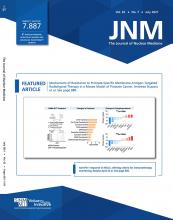Visual Abstract
Abstract
Cognitive impairment is a frequent complaint in coronavirus disease 2019 (COVID-19) and can be related to cortical hypometabolism on 18F-FDG PET at the subacute stage. However, it is unclear if these changes are reversible. Methods: We prospectively assessed the Montreal Cognitive Assessment scores and 18F-FDG PET scans of 8 COVID-19 patients at the subacute stage (once no longer infectious) and the chronic stage (˜6 mo after symptom onset). The expression of the previously established COVID-19–related covariance pattern was analyzed at both stages to examine the time course of post–COVID-19 cognitive impairment. For further validation, we also conducted a conventional group analysis. Results: Follow-up 18F-FDG PET revealed that there was a significant reduction in the initial frontoparietal and, to a lesser extent, temporal hypometabolism and that this reduction was accompanied by a significant improvement in cognition. The expression of the previously established COVID-19–related pattern was significantly lower at follow-up and correlated inversely with Montreal Cognitive Assessment performance. However, both 18F-FDG PET and cognitive assessment suggest a residual impairment. Conclusion: Although a significant recovery of regional neuronal function and cognition can be clearly stated, residuals are still measurable in some patients 6 mo after manifestation of COVID-19. Given the current pandemic situation and tremendous uncertainty concerning the long-term effects of COVID-19, the present study provides novel insights of the highest medical and socioeconomic relevance.
Footnotes
Published online Mar. 31, 2021.
- COPYRIGHT © 2021 by the Society of Nuclear Medicine and Molecular Imaging.
Immediate Open Access: Creative Commons Attribution 4.0 International License (CC BY) allows users to share and adapt with attribution, excluding materials credited to previous publications. License: https://creativecommons.org/licenses/by/4.0/. Details: http://jnm.snmjournals.org/site/misc/permission.xhtml.








